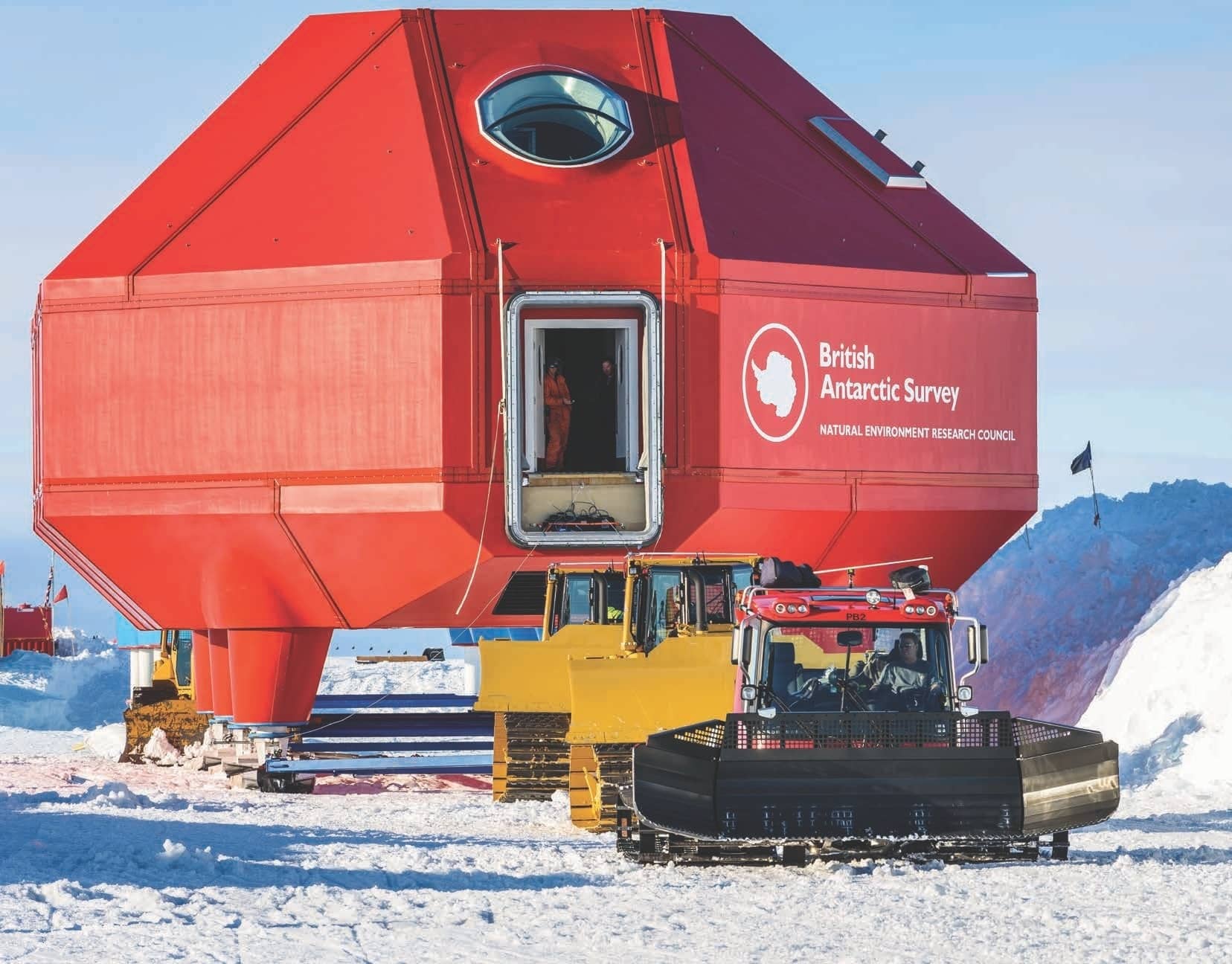試す 金 - 無料
Monster Movers
BBC Earth
|July - August 2019
Think moving house is difficult? Take a look at the gargantuan machines that are needed to move rockets, wind turbines, Antarctic bases and even entire buildings

SNOW EASY TASK
HALLEY ANTARCTIC RESEARCH STATION
‘Big Red’ is the affectionate name for the main living area in the British Antarctic Survey’s Halley Research Station. It houses a dining room, kitchen, walk-in fridge, lounge, gym and a small bar. Empty, it weighs about 220 tonnes. In early 2017, when the entire station had to be moved 24km east (due to a crack in the Brunt Ice Shelf on which it sits), Big Red was one of the largest items on the shift list. Moving it required two bulldozers as well as a ‘snow groomer’ called a PistenBully, and took almost five hours. Now back at their relocated base, Halley researchers continue to monitor the cracks in the ice shelf, study polar climate change and search for Antarctic meteorites.
A STELLAR JOB
ALMA TELESCOPE ANTENNA
Astronomers in the Atacama Desert, Chile, are observing nearby galaxies to understand how stars are formed. Their work wouldn’t be possible without the help of ALMA, the Atacama Large Millimeter/ submillimeter Array, whose 66 separate antennas are spread across the Chajnantor Plateau, 5km above sea level, to form a giant telescope. The antennas don’t stay put, though; they’re constantly being moved around – at a rate of about three a week – to bring different celestial objects into focus. “Astronomers request their preferred telescope configurations based on the resolution and field of view of the targets they want to observe,” says Dr Norikazu Mizuno, ALMA’s head of engineering. In the image below, an antenna travels aboard ‘Lore’, one of two 20-metre-long transporters used to reposition the antennas. It’s a slow process though – when they’re loaded down like this, the transporters can only trundle
このストーリーは、BBC Earth の July - August 2019 版からのものです。
Magzter GOLD を購読すると、厳選された何千ものプレミアム記事や、10,000 以上の雑誌や新聞にアクセスできます。
すでに購読者ですか? サインイン
BBC Earth からのその他のストーリー

BBC Earth
World's First Malaria Vaccine
The World Health Organization’s director-general hails ‘historic moment’ as mass immunisation of African children begins
2 mins
Volume 14 - Issue 2

BBC Earth
Is River Pollution Putting The Species In Jeopardy Again?
Ten years ago, it was jubilantly announced that o ers had returned to every county in England. But is river pollution putting the species in jeopardy again?
11 mins
Volume 14 - Issue 2

BBC Earth
The Big Burnout
Long hours, low pay and a lack of appreciation — among other things — can make for a stressful workplace and lead to burnout. It’s something we should all be concerned about, because over half of the workforce reports feeling it
10 mins
Volume 14 - Issue 2

BBC Earth
Putting Nature To Rights
More countries are enshrining the right to a clean environment into law. So if a company or government is impinging upon that right, you could take them to court
10 mins
Volume 14 - Issue 2

BBC Earth
Mega Spaceship: Is It Possible For China To Build A Kilometre-Long Spacecraft?
Buoyed on by its successful Moon missions, China has launched a five-year study to investigate the possibility of building the biggest-ever spacecraft
4 mins
Volume 14 - Issue 2

BBC Earth
Are We Getting Happier?
Enjoying more good days than bad? Feel like that bounce in your step’s getting bigger? HELEN RUSSELL looks into whether we’re all feeling more cheery…
3 mins
Volume 14 - Issue 2

BBC Earth
“Unless the Japanese got the US off their backs in the Pacific, they believed they would face complete destruction”
Eighty years ago Japan’s surprise raid on Pearl Harbor forced the US offthe fence and into the Second World War. Ellie Cawthorne is making a new HistoryExtra podcast series about the attack, and she spoke to Christopher Harding about the long roots of Japan’s disastrous decision
13 mins
Volume 14 - Issue 2

BBC Earth
Your Mysterious Brain
Science has mapped the surface of Mars and translated the code for life. By comparison, we know next to nothing about what’s between our ears. Over the next few pages, we ask leading scientists to answer some of the most important questions about our brains…
28 mins
Volume 14 - Issue 2

BBC Earth
Why Do We Fall In Love?
Is it companionship, procreation or something more? DR ANNA MACHIN reveals what makes us so willing to become targets for Cupid’s arrow
2 mins
Volume 14 - Issue 2

BBC Earth
Detecting the dead
Following personal tragedy, the creator of that most rational of literary figures, Sherlock Holmes, developed an obsession with spiritualism. Fiona Snailham and Anna Maria Barry explore the supernatural interests of Sir Arthur Conan Doyle
7 mins
Volume 14 - Issue 2
Translate
Change font size
